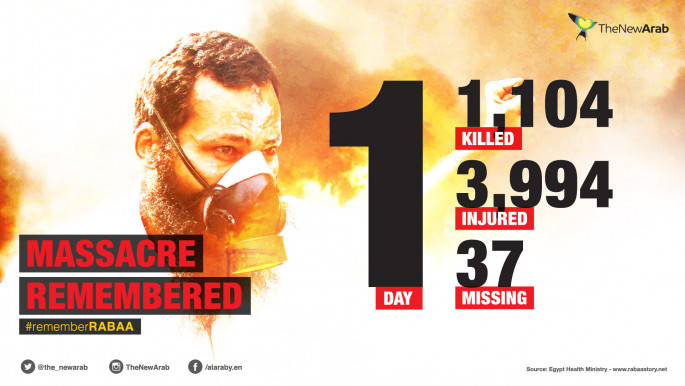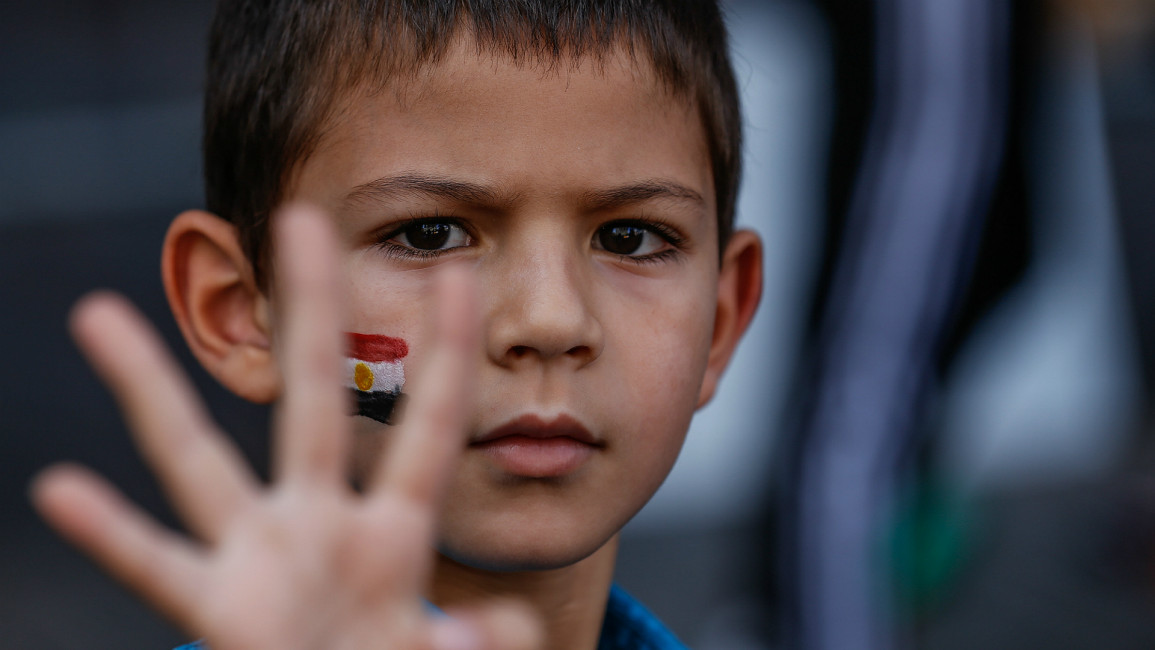
In memory of Rabaa: A national tragedy
There are a handful of events over the past few years in Egypt that "changed everything". While 25 January was an historic day, the first time the Revolution's alchemy seemed to forever change Egypt was on 28 January, 2011. A barrier of fear between the people and the police was snapped in half, as hordes of protesters synthesised and organised into a dominant force greater than or equal to the dreaded security apparatus.
Whether or not it would last, that day had given birth to a sense of unity, purpose and hope in change that had eluded many Egyptians born during the Mubarak reign, it was a game changer.
By contrast, over two years later, another one of those moments occurred, pushing for change in the opposite direction.
On 14 August 2013, Egypt witnessed its largest massacre of civilians in its modern history, when around one thousand pro-Morsi demonstrators were killed in clashes with security forces in Cairo – primarily around Rabaa al-Adaweya intersection.
The magnitude of death and killing should stand alone as a concept that should give pause and inspire action, without many caveats or footnotes that do not concern human values and collective grief.
Unfortunately, the memory of "Rabaa" has become so riddled with political grandstanding, and conspiracy theories that the humanistic element has been marginalised in some of the public discourse on the subject.
 |
On 14 August 2013, Egypt witnessed its largest massacre of civilians in its modern history, when around one thousand pro-Morsi demonstrators were killed in clashes with security forces in Cairo |  |
 |
|
One of the hallmarks of a collective identity and unified society is its shared memory of major tragedies as well as triumphs. The actions of so-called societal "leaders” both in the run-up and aftermath of Rabaa have done little to honour the memory of the tragedy.
In fact, on the part of the apologists for this regime, there have been recurring attempts to deny much wrong doing on the part of security forces, claiming it was all in self-defence, while attempting to claim that the Rabaa massacre was in fact a chapter in the bloody war on terrorism, making these casualties of war.
On the part of many of the Muslim Brotherhood (MB) apologists, Rabaa had become a rallying call for the return of Mohamed Morsi to the presidency, an almost laughable proposition at this point.
It puts many activists in many awkward positions, as many who would like to honour the memory of the dead and hold their killers accountable, are at the same time unwilling to be represented as calling for the return of the ex-president.
 |
Unfortunately, the memory of "Rabaa" has become so riddled with political grandstanding, and conspiracy theories that the humanistic element has been marginalised in some of the public discourse on the subject |  |
The Rabaa sit-in itself, and Morsi’s last couple of months in power have in fact seen the MB leadership encourage their followers in a more divisive path. They seemed to take what was the perfect moment to capitalise on a transcendent and empowering unity among Egyptians and instead use it for purely political ends.
This played right into the hands of the regime’s plans to dehumanise those murdered and desensitise the population for what was to come: a return to a situation where the state not only holds monopoly over violence, but exercises that monopoly willingly.
After the 25 January Revolution, one of the most important results, second only to the ousting of Mubarak, was the actual defeat of security forces. In the years 2011 and 2013, police went noticeably MIA, especially from the streets of Cairo, for better or for worse. In order for them to return in a seamless and positive light, there would have had to have been profound changes to the entire apparatus. If not, then their return would be not only vengeful, but with the kind of “flair” that would leave no doubt as to who exactly runs the country. The iron-fist of police, has returned, and for many, the shock of the Rabaa massacre, has prepared them for such a return, and perhaps trivialises many subsequent transgressions by them.
In addition, Rabaa and its aftermath pointed to a policy of extermination for centres of power within the MB, among Morsi supporters and now very noticeably among the still-galvanised revolutionary youth.
Tens of thousands were imprisoned afterwards, many of whom were never formally charged. The Muslim Brotherhood became an easily accessible scarecrow, and ready scapegoat whenever regime apologists are in need of an antagonist in any conspiracy theory. The government placed the blame on those in the sit-in, despite the fact that the vast majority of those who visited the sit-in out of curiosity and were not supporting Morsi, did not find any evidence of intentions for imminent violence, myself included.
In much of the public sphere and in the media we reached a point where mention of the events evokes political sentiments. Bloodshed and turmoil region-wide are becoming abstract concepts, lost as statistics, when in fact the empathy of understanding the pain of the victims and their families is the only way of living through it.
However, for the regime, empathy means humanity which means basic human rights, which – for a certain group of political activists – is not on the table. Even if police never open fire again, massacres are possible, because a massacre did happen.
 |
Bloodshed and turmoil region-wide are becoming abstract concepts, lost as statistics, when in fact the empathy of understanding the pain of the victims and their families is the only way of living through it |  |
In the absence of any true accountability, Rabaa will be a boon for this regime. The only way to truly move beyond it with society in tact is that for the majority to treat it as it is, an unthinkable travesty and a day(s) of unparalleled bloodshed on the streets of Cairo.
If the sanctity of human life cannot unite communities in Egypt and the Arab World, then not much else will.
#RememberRabaa: Watch our special video coverage here and join the conversation by tweeting us @The_NewArab:
Mohamed ElMeshad is a journalist and a PhD candidate at SOAS, focusing on the political economy of the media. He worked extensively in Egypt, Bahrain, West Africa, the UK and US.
Recently, he contributed to the Committee to Protect Journalists’ book, Attacks on the Press (2015).
Opinions expressed in this article remain those of the author and do not necessarily represent those of The New Arab, its editorial board or staff.



